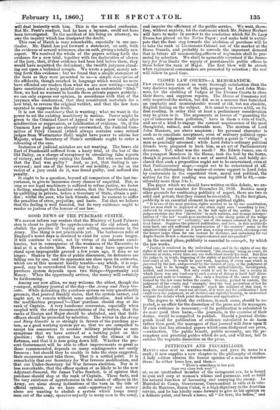CLOSED LAW COURTS—A MEMORANDUM.
FEW events have caused us more thorough satisfaction than the very decisive rejection of the bill, proposed by Lord John Man- ners, for the enabling of Judges of the Divorce Courts to close their doors, and suppress reports. The House of Commons not only negatived the motion, but did so in a manner that furnished an emphatic and unmistakeable record of old, but not obsolete, English feeling on the subject. It is usual to receive a.bill, on its first reading, in order that at least a preliminary consideration may be given to it. The arguments in favour of " guarding the eye of innocence from pollution," have in them a vein of truth, and are of a kind to engage the earnest acquiescence of the most thoughtful, refined, and estimable men. The motives of Lord John Manners, are above suspicion ; his personal character is such as to conciliate acceptance, even of ordinary political oppo- nents, and judgment itself would stretch a point to " oblige " a man so generally esteemed ; while Lord John's ordinary political friends were prepared to back him, as an act of Parliamentary decorum. Yet, what was the result ? Mr. Edwin James, one of the youngest Members in the House, took the bull by the horns, though it presented itself as a sort of sacred bull, and boldly de- clared that such a proposition ought not to be entertained, even at that Parliamentary stage,—ought not to be entertained at all. And, -notwithstanding the matter-of-course support to Lord John by conformists in the superficial view, moral and political, the motion for the first reading was negatived by 268 to 83,—con- siderably more than 3 to 1.
The paper which we should have written on'this debate, we an- ticipated in our number for December 31, 1859. Besides many other grounds for continuing publicity of report, there are two so solid and potent, that they cannot be overruled. In the first place, publicity is an essential element in our political rights.
"It is one of the most precious rights secured to us by our constitution, that no man shall be deprived of any other right save ' according to law,' enforced by responsible judges, in the full sight of the public. Let the judges exercise any free discretion' in such matters, and strange interpre- tations of the law' would pass unchecked,—the sharp point of the wedge introduced in favour of ' authority,' one of the names assumed by the poli- tical Satan. Suppress the printed publication and how, in this multitudi- nous land, can any sufficient representation of the country' assist in the administration of justice as it now does, noting every error, checking even the honest judge when for one instant he deviates, and sustaining for our Anglo-Saxon Bench a character unprecedented and unequalled ? "
In the second place, publicity is essential to example, by which the law works.
"Justice is rendered in the individual case, and in the rights of one the rights of all are recognized and confirmed, 'the country' being in court, its interests at stake, every time any one individual stands his trial. But thus the judge is, in truth, disposing of the rights of multitudes who never oome into court at all. It would be peoiwork, hopeless, if every ease which is governed by the law, and governed by the verdict of jury, or the judgment of judge, had to be brought up, dealt with authoritatively, investigated, settled, and recorded. Not only could it not be done, but a society in which there was any tendency to such a state of things is itself half disor- ganized and unfit to continue. No ; only a fraction of the cases truly go- verned by the law come before the courts. Society, guided by custom, the judgment of the courts, and example,' does the vast proportion of law for itself. And how could ' the example' reach the millions of this land; to keep the multitude of cases out of court, if it were not for publication ? how could even the judgment, in all itsforce and rightful bearing, be understood without the details which point its motives and application
The degree to which the evidence, in such cases, should be re-
ported, is an affair for the discretion of the press and its managers. If such evidence is necessary,—if its publication is calculated to do more good than harm,—the journals, in the exercise of their duties, would be compelled to publish. Should a journal distin- guish itself for publication of evidence calculated to do harm rather than good, the managers of that journal will draw upon it the fate that has attended papers which once disfigured our press, —extinction. The public benefit, public necessity, are the pe- remptory and practical guides which do not, and will not, fail to enforce the requisite discretion on the press.






























 Previous page
Previous page